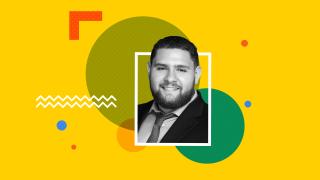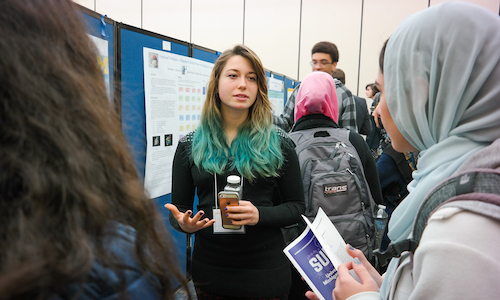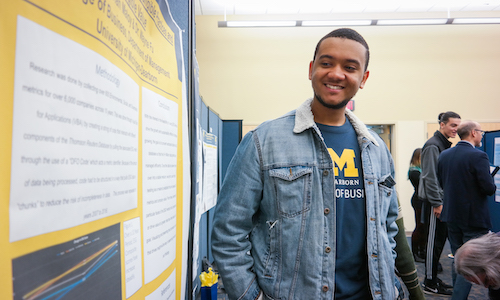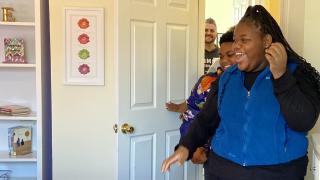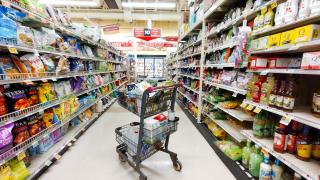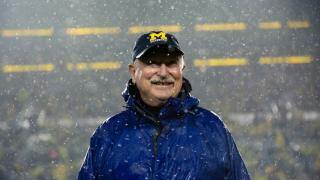In one corner, College of Business student Adrian Maloy shared his insights on the impact that socially conscious business practices have on company stock valuations — a project, he said, that helped earn him a summer job offer from the Federal Reserve Bank of New York. And a few presentation posters away, political science major and first-time research assistant Rebekah Wilson confidently and enthusiastically walked dozens of attendees through what she did in lieu of a summer break: a collaboration with Social Sciences Assistant Professor Emily Matthews Luxon that dug into the communication strategies of environmental nonprofits.
“For me, the big takeaway is that research is not what I thought it was,” Wilson explained. “I had this idea that you had to be in more of a lab setting, staring into a microscope or something. But our work was a lot of digging through databases and searching for information, and that’s way more in my wheelhouse. There is a way that political scientists research that is very different — but it is still research. And I learned a lot from Professor Matthews Luxon that there are very specific ways you make that research solid.”
Harnessing the natural energy — and wisdom — behind that beginner’s mindset is one of the things that’s special about undergraduate research, according to SURE co-organizer and Associate Provost for Graduate, Global and Digital Education Ilir Miteza.
“It makes them ‘explorers’ — as opposed to ‘tourists’ or ‘locals,’” Miteza said. “For example, I’m an economist, and for many things, I wear economist lenses; I have been captured by my discipline. But undergraduate research exposes a student to the jargon and the concepts and the methods, without necessarily always capturing them — without making them ‘locals.’ And that sets them up to explore other projects and wear other lenses.”
Indeed, SURE co-organizer and Biology and Biochemistry Professor Marilee Benore said that ethos of exploration and collaboration also gave participating faculty valuable chances to bust out of their research silos. That happened throughout the summer, as the students and their mentors convened periodically for skill-building workshops and show-and-tells.
And for Benore herself, even the finale event sparked an eye-opening conversation with fellow SURE co-organizer and IMSE Assistant Professor DeLean Tolbert, whose research focuses on underrepresented minorities in engineering fields.
“I’m really interested in women in STEM, and I didn’t know that some of the data she was using even existed,” Benore said. “So that’s really exciting because their work helps our work. Often collaborations start with a chance meeting like that. And a program like this creates more opportunities for those lucky moments.”
And lucky for all the students and faculty who want to follow in the footsteps of SURE’s inaugural cohort: Benore didn’t hesitate to give an unqualified ‘yes’ when asked if the program would be back in 2019.
Big congrats to four SURE student researchers who took home special awards for their poster presentations. Mariam Nasser and Anna Schmidt earned the Most Intriguing award (Using Virtual Reality to Study Spatial Cognition). Best Presentation went to Taima Younes (Efficiency of a Moving Mesh System with a Curvature-type Monitor Applied to Burgers' Equation). And Kathem Bazzi won for Best Poster (Thermal Effects on the Structure and Magnetic Properties of Multicomponent Nanocrystalline Fe26.67Co26.67Ni26.67Al10Si10 Powder).
